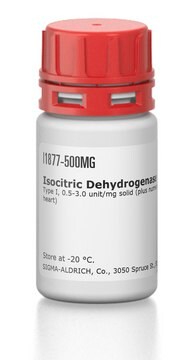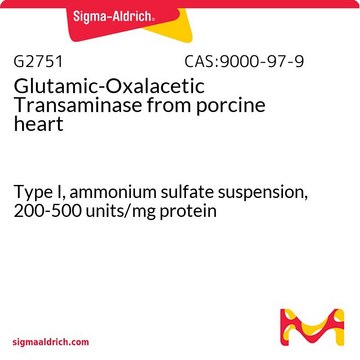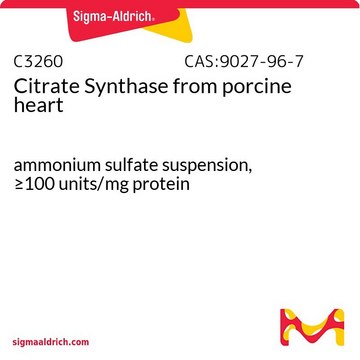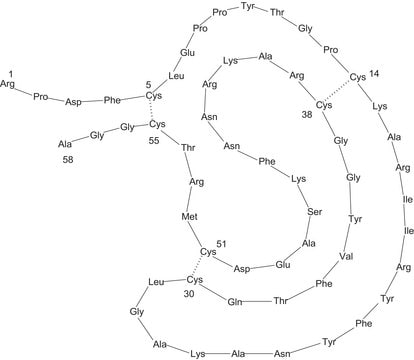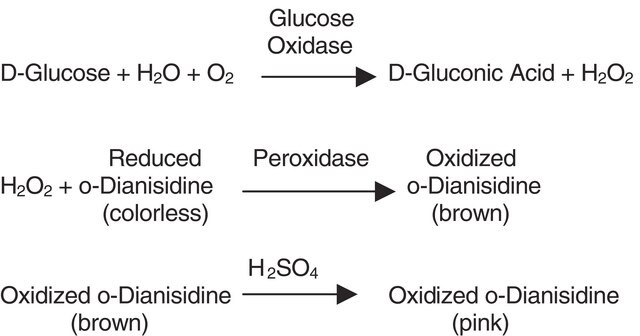A5384
Aconitase from porcine heart
Synonyme(s) :
Aconitate hydratase, Citrate (isocitrate) hydrolyase
Se connecterpour consulter vos tarifs contractuels et ceux de votre entreprise/organisme
About This Item
Numéro CAS:
Numéro MDL:
Code UNSPSC :
12352204
Nomenclature NACRES :
NA.54
Produits recommandés
Source biologique
Porcine heart
Forme
solid
Poids mol.
~66 kDa by gel filtration
Température de stockage
−20°C
Application
Aconitase may be usefull in diabetes research as well as to study structural conservation between iron-responsive element binding proteins (IRE-BP) and isomerases .
Actions biochimiques/physiologiques
Aconitase catalyses the stereo-specific isomerization of citrate to isocitrate via cis-aconitate in the tricarboxylic acid cycle. Aconitase is inhibited by cyanide, sulfide and copper and mercury at low concentrations. It is competitively inhibited by trans-aconitate. Aconitase contains an internal Fe-S cluster which is responsible for its activity.
Définition de l'unité
One unit will convert 1.0 μmole of citrate (via cis-aconitate) to isocitrate per min at pH 7.4 at 25 °C.
Remarque sur l'analyse
Crude preparation containing aconitase activity
Code de la classe de stockage
11 - Combustible Solids
Classe de danger pour l'eau (WGK)
WGK 3
Point d'éclair (°F)
Not applicable
Point d'éclair (°C)
Not applicable
Équipement de protection individuelle
Eyeshields, Gloves, type N95 (US)
Certificats d'analyse (COA)
Recherchez un Certificats d'analyse (COA) en saisissant le numéro de lot du produit. Les numéros de lot figurent sur l'étiquette du produit après les mots "Lot" ou "Batch".
Déjà en possession de ce produit ?
Retrouvez la documentation relative aux produits que vous avez récemment achetés dans la Bibliothèque de documents.
Les clients ont également consulté
Vinay A Patil et al.
The Journal of biological chemistry, 288(3), 1696-1705 (2012-11-30)
Cardiolipin (CL) is the signature phospholipid of mitochondrial membranes, where it is synthesized locally and plays a critical role in mitochondrial bioenergetic functions. The importance of CL in human health is underscored by the observation that perturbation of CL biosynthesis
Geoffrey F Kelso et al.
Chemistry & biology, 19(10), 1237-1246 (2012-10-30)
Superoxide (O(2)(·-)) is the proximal mitochondrial reactive oxygen species underlying pathology and redox signaling. This central role prioritizes development of a mitochondria-targeted reagent selective for controlling O(2)(·-). We have conjugated a mitochondria-targeting triphenylphosphonium (TPP) cation to a O(2)(·-)-selective pentaaza macrocyclic
Béatrice Py et al.
Molecular microbiology, 86(1), 155-171 (2012-09-13)
Biosynthesis of iron-sulphur (Fe-S) proteins is catalysed by multi-protein systems, ISC and SUF. However, 'non-ISC, non-SUF' Fe-S biosynthesis factors have been described, both in prokaryotes and eukaryotes. Here we report in vitro and in vivo investigations of such a 'non-ISC
S S Popov et al.
Eksperimental'naia i klinicheskaia farmakologiia, 75(7), 32-35 (2012-10-03)
A combined therapy with melaxen led to a decrease in the activity of gamma-glutamyl transpeptidase and the level of diene conjugates in blood serum of patients with the drug-induced hepatitis developing on the background of administration of antituberculous preparations. These
Meghna Mittal et al.
Microbiology (Reading, England), 159(Pt 1), 68-76 (2012-11-10)
The role of the CcpC regulatory protein as a repressor of the genes encoding the tricarboxylic acid branch enzymes of the Krebs cycle (citrate synthase, citZ; aconitase, citB; and isocitrate dehydrogenase, citC) has been established for both Bacillus subtilis and
Notre équipe de scientifiques dispose d'une expérience dans tous les secteurs de la recherche, notamment en sciences de la vie, science des matériaux, synthèse chimique, chromatographie, analyse et dans de nombreux autres domaines..
Contacter notre Service technique